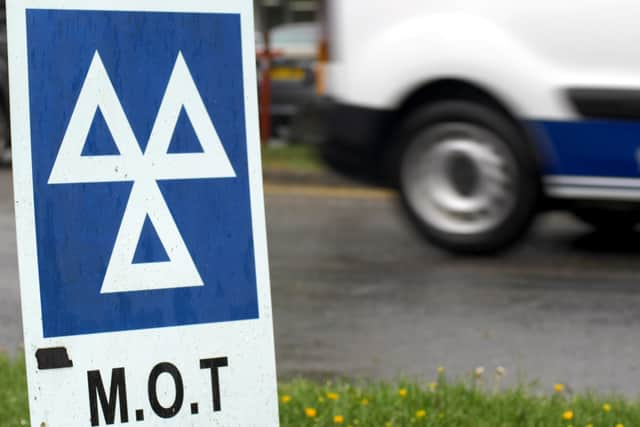Scrapping annual MOT: what the DfT has said about plans for two-year test and how drivers have reacted
and live on Freeview channel 276
The majority of British drivers are against the Government’s plan to relax MOT rules, according to a new survey.
Most motorists have serious road safety concerns about the proposal to change the compulsory MOT from every year to every two years.
Advertisement
Hide AdAdvertisement
Hide AdFormer Transport Secretary Grant Shapps floated the idea of a bi-annual MOT earlier this year as a way to address the cost of living crisis. The RAC, which conducted the survey, said it understood the plans were still under consideration under his replacement at the Department for Transport (DfT), Anne-Marie Trevelyan.
However, the RAC poll of motorists found that 55% thought changing the MOT rules was a bad idea, with just 22% in favour. The other 23% were reportedly unsure about the plan.


Almost all of those opposed (98%) said they thought the move would lead to more dangerous vehicles on the roads. Twenty per cent thought it could lead to an increase in the number of collisions and 61% believed it would result in more breakdowns.
Most (58%) also doubted whether the move would save drivers money in the long run. Cutting the test frequency would save drivers a maximum of £27.40 over two years but could result in minor problems developing into more serious and more expensive issues. Some drivers also feared garages would increase other costs to make up for lost revenue.
Advertisement
Hide AdAdvertisement
Hide AdImportant safety tool
The RAC’s head of roads policy, Nicholas Lyes, said that while drivers were rightly sceptical about the cost benefits, the issue of road safety was of far greater concern. He said he had written to the the new Transport Secretary urging her to “consign this idea to the bin” and look at other means of saving drivers money.
He commented: “Many drivers look at the MOT test as an important tool to see if their vehicle is in a safe and roadworthy condition. It also gives drivers peace of mind from an overall road safety point of view to know that every other vehicle on the road has undergone the same checks.
“The idea that changing the MOT to every two years will save drivers money is met with huge scepticism as our research shows many have rightly identified that it may end up costing them more if faults go undetected and as a result get worse or cause other defects.
“But cost is secondary to road safety. We already know that many vehicles fail their MOT because of illegal tyre tread, so if this figure were to get significantly bigger more lives would be put at risk. And we know from our breakdown statistics that tyres in poor condition are far more likely to blow out or get punctured.
Advertisement
Hide AdAdvertisement
Hide Ad“There is a real danger that if the Government proceeds with these proposals that we could see an increase in the number of collisions and more injuries and deaths due to more unroadworthy vehicles using our roads, and an overall reduction in road safety.”
The DfT told the PA news agency that no decision has been made on changing MOT testing frequency and it would not comment on future Government policy.
Currently, all cars need an MOT on the third anniversary of their first registration and a repeat test even year after that.
Of those who supported easing MOT rules, 74% said they did so because modern cars are more reliable and do not need annual checks, while more than half (54%) believe it will save them money. A confident 41% told the RAC that they checked their car for basic roadworthiness and didn’t need to pay for someone to do it officially on an annual basis.
Advertisement
Hide AdAdvertisement
Hide AdThe latest data from the Department for Transport shows that in the first three months of 2022 29% of cars and light vans presented for a class 4 MOT failed the test. Of those, 25% failed on lighting and electrical faults, 19% failed on suspension, 16% on brakes and 12% on tyre defects.
Comment Guidelines
National World encourages reader discussion on our stories. User feedback, insights and back-and-forth exchanges add a rich layer of context to reporting. Please review our Community Guidelines before commenting.
